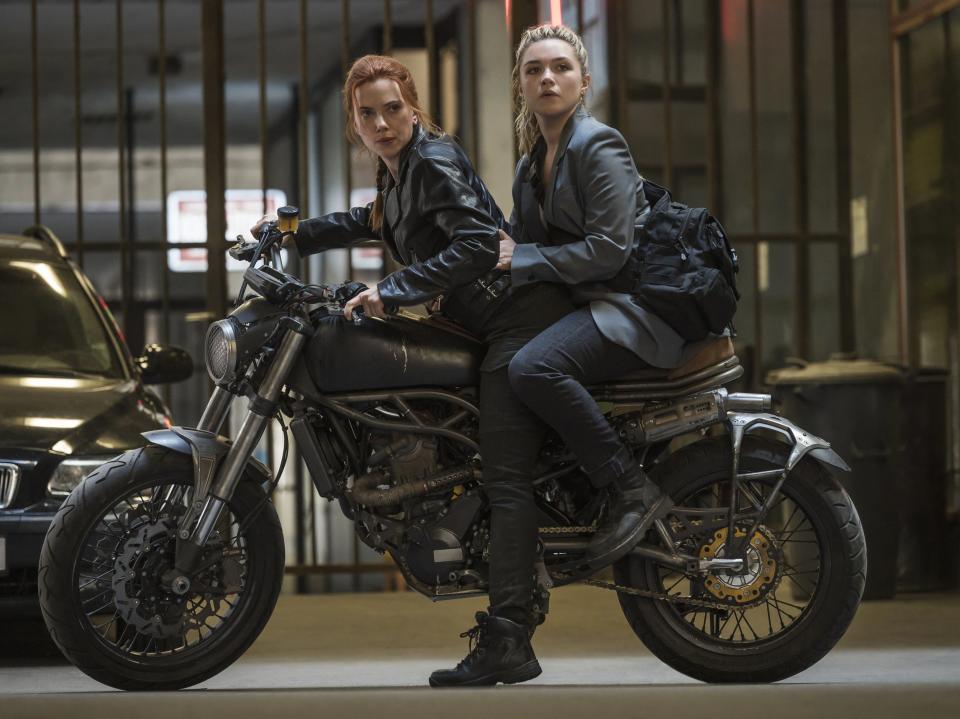Black Widow review: A valiant but chequered attempt to do right by Marvel’s first female Avenger

Dir: Cate Shortland. Starring: Scarlett Johansson, Florence Pugh, David Harbour, O-T Fagbenle, William Hurt, Ray Winstone, Rachel Weisz. 12A, 134 mins.
Of all the heroes in Marvel’s Cinematic Universe, it’s Scarlett Johansson’s Black Widow who deserves the biggest apology from her creators. Over the span of a decade, she’s been treated like a cipher to drool over (the actor has herself criticised the hypersexualisation of her character in 2010’s Iron Man 2), called a monster for not being able to conceive, and then killed off without even the dignity of a funeral in Avengers: Endgame. The steel-thighed, emotionally bruised Russian agent, otherwise known as Natasha Romanoff, has been hollowed out like a porcelain doll through year after year of poor screenwriting.
At least now, after all this time, she finally has her own film. Black Widow is a valiant but chequered attempt to do right by the legacy of Marvel’s first female Avenger. It’s hindered most by the sensation that this has all come a little too late. Director Cate Shortland and writer Eric Pearson have tried to pry out new meaning from between the lines of the character’s official biography, setting this particular adventure in a time after Captain America: Civil War and before Avengers: Infinity War. Natasha, at this point, is an international fugitive still in the grieving stages of the Avengers’s very public break up. Having fled to Europe, she finds herself confronted by her own past – namely, Yelena Belova (Florence Pugh), a pseudo-sister from her time in the Red Room, a programme of psychological torture that shaped young girls into fearsome killers.
Yelena reveals to Natasha that the man responsible (Ray Winstone’s Deykov, whose Russian accent is enough of a war crime in its own right) is still lurking in the dark. The Red Room was never defeated; it simply evolved into something altogether crueller and more sinister. Black Widow is, inescapably, a story about the abuse and exploitation of young women, who Dreykov so casually names as “the only natural resource that the world has too much of”. And there are moments in Pearson’s script, and in Shortland’s handling of those scenes, that are brutally and tragically effective – Yelena and Natasha talk about the forced sterilisation they underwent in exactly the kind of offhand, eerily detached manner that speaks to how deeply suppressed their trauma still is.
The problem is that these ideas are so much better expressed through Yelena, who arrives emotionally complete and having never met a space raccoon. She’s also bolstered by an absolute knockout performance from Pugh, who combines her characters from Little Women and Midsommar – a little petulance here, a little melancholy there – to conjure someone who is warm, witty yet crumbling from within. Yelena’s entire identity has always existed at the whim of others, so much so that she’s grown irreversibly attached to the fake parents she was once assigned on a mission. One of them, Soviet supersoldier Red Guardian (David Harbour), has an unhealthy fixation with Captain America, his “great adversary in this great theatre of geopolitical conflict” (the two don’t seem to have met). The other, Melina (Rachel Weisz), owns a worrying number of pigs. The pair make for some affable comic relief, as they bicker and sourly down vodka at the dinner table.

Johansson, meanwhile, does the best she can with the material, though her humanity tends to come out in smaller details – like a scene of her, alone, watching Moonraker and mouthing along to the terrible puns. Otherwise, she’s still the unflappably elegant fighter who kicks, twirls, and always lands in a superhero pose (admittedly, there’s a good running joke about this). Black Widow features some of the best fight choreography of the entire MCU, but Matthew Schmidt and Leigh Folsom Boyd’s editing has a chaotic quality to it that often turns an intricately designed sequence into a spinning blur of limbs. There’s one standout scene where Yelena and Natasha, much like Charlize Theron in Atomic Blonde, tear a city apartment to pieces as they fling assorted homeware at each other’s heads.
More often, the action will simply dissolve into a predictable CGI gruel. Considering Black Widow is one of the few heroes who can’t fly, she spends a concerning amount of this film plummeting through the air. And the film’s mystery villain, Taskmaster, who comes with the ability to perfectly mimic anyone’s movements, is an intriguing idea that only ever feels half-deployed. But, for all of Black Widow’s flaws, the things that it does right build a more hopeful future for the women of the MCU – one with stories that not only invoke real and relatable experiences, but are actually being told by women behind the camera. It’s just a shame that Natasha never had this from the very start.
Read More
Marvel fans propose MCU standalone films as Kevin Feige teases more prequels after Black Widow
Marvel fans react as Scarlett Johansson calls out depiction of Black Widow in Iron Man 2

